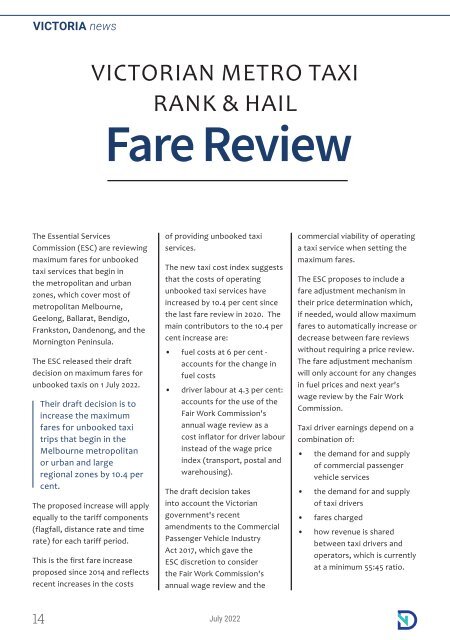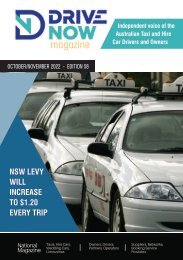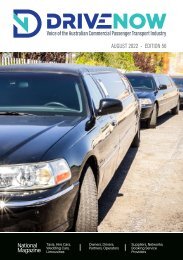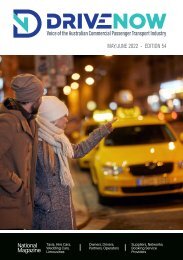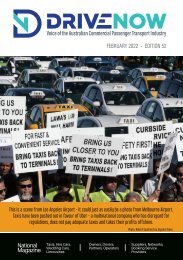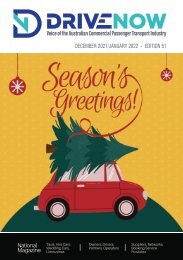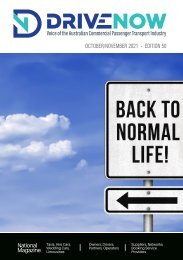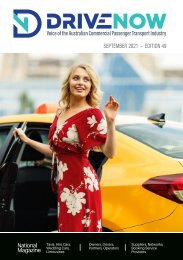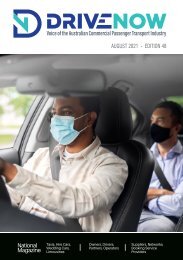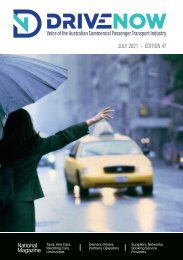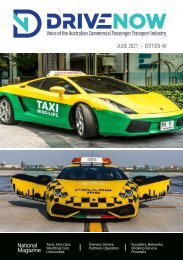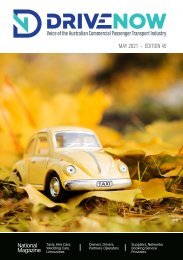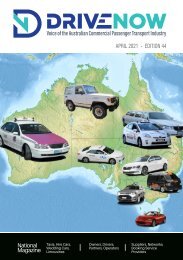DRIVE NOW July 2022
Australia's only Magazine for the Commercial Passenger Transport Industry. News and views for Drivers, Owners and Operators of Taxi, Hire Car, Limousine, Ride Share, Booked Hire Vehicles, Rank and Hail Cars
Australia's only Magazine for the Commercial Passenger Transport Industry. News and views for Drivers, Owners and Operators of Taxi, Hire Car, Limousine, Ride Share, Booked Hire Vehicles, Rank and Hail Cars
You also want an ePaper? Increase the reach of your titles
YUMPU automatically turns print PDFs into web optimized ePapers that Google loves.
VICTORIA news<br />
VICTORIAN METRO TAXI<br />
RANK & HAIL<br />
Fare Review<br />
The Essential Services<br />
Commission (ESC) are reviewing<br />
maximum fares for unbooked<br />
taxi services that begin in<br />
the metropolitan and urban<br />
zones, which cover most of<br />
metropolitan Melbourne,<br />
Geelong, Ballarat, Bendigo,<br />
Frankston, Dandenong, and the<br />
Mornington Peninsula.<br />
The ESC released their draft<br />
decision on maximum fares for<br />
unbooked taxis on 1 <strong>July</strong> <strong>2022</strong>.<br />
Their draft decision is to<br />
increase the maximum<br />
fares for unbooked taxi<br />
trips that begin in the<br />
Melbourne metropolitan<br />
or urban and large<br />
regional zones by 10.4 per<br />
cent.<br />
The proposed increase will apply<br />
equally to the tariff components<br />
(flagfall, distance rate and time<br />
rate) for each tariff period.<br />
This is the first fare increase<br />
proposed since 2014 and reflects<br />
recent increases in the costs<br />
of providing unbooked taxi<br />
services.<br />
The new taxi cost index suggests<br />
that the costs of operating<br />
unbooked taxi services have<br />
increased by 10.4 per cent since<br />
the last fare review in 2020. The<br />
main contributors to the 10.4 per<br />
cent increase are:<br />
• fuel costs at 6 per cent -<br />
accounts for the change in<br />
fuel costs<br />
• driver labour at 4.3 per cent:<br />
accounts for the use of the<br />
Fair Work Commission's<br />
annual wage review as a<br />
cost inflator for driver labour<br />
instead of the wage price<br />
index (transport, postal and<br />
warehousing).<br />
The draft decision takes<br />
into account the Victorian<br />
government's recent<br />
amendments to the Commercial<br />
Passenger Vehicle Industry<br />
Act 2017, which gave the<br />
ESC discretion to consider<br />
the Fair Work Commission's<br />
annual wage review and the<br />
commercial viability of operating<br />
a taxi service when setting the<br />
maximum fares.<br />
The ESC proposes to include a<br />
fare adjustment mechanism in<br />
their price determination which,<br />
if needed, would allow maximum<br />
fares to automatically increase or<br />
decrease between fare reviews<br />
without requiring a price review.<br />
The fare adjustment mechanism<br />
will only account for any changes<br />
in fuel prices and next year's<br />
wage review by the Fair Work<br />
Commission.<br />
Taxi driver earnings depend on a<br />
combination of:<br />
• the demand for and supply<br />
of commercial passenger<br />
vehicle services<br />
• the demand for and supply<br />
of taxi drivers<br />
• fares charged<br />
• how revenue is shared<br />
between taxi drivers and<br />
operators, which is currently<br />
at a minimum 55:45 ratio.<br />
14 <strong>July</strong> <strong>2022</strong>


